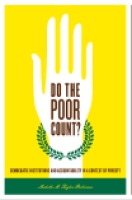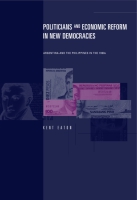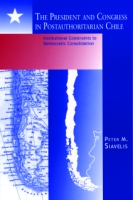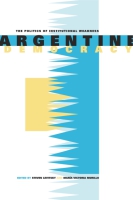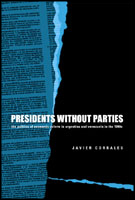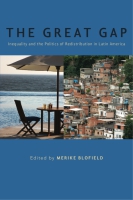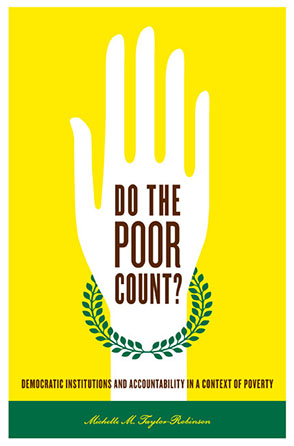
Do the Poor Count?
Democratic Institutions and Accountability in a Context of Poverty
Michelle M. Taylor-Robinson
Do the Poor Count?
Democratic Institutions and Accountability in a Context of Poverty
Michelle M. Taylor-Robinson
“Despite the presence of large—even majority—poor populations in Latin America, democratic institutions and policies frequently do not reflect their interests. Taylor-Robinson’s book presents a thoughtful analysis of the causes of that ‘representation gap.’ She offers a rich institutional account, suggesting that a combination of institutions (electoral, nominations, and clientelistic) leads elected officials to respond differently to their privileged and poor constituencies. Both cross-national survey data and a detailed study of the Honduran case support her claim that the best representation the poor can hope for is usually clientelistic representation, and even that is not guaranteed. Yet Taylor-Robinson provides a final twist, insisting that clientelistic representation itself offers more benefits than are usually seen, for the poor themselves and for the stability of their political systems. Overall, this is an impressive book, which fruitfully applies the theoretical tools of rational-choice institutionalism to one of the most important problems of contemporary Latin American politics.”
- Description
- Reviews
- Bio
- Table of Contents
- Sample Chapters
- Subjects
“Despite the presence of large—even majority—poor populations in Latin America, democratic institutions and policies frequently do not reflect their interests. Taylor-Robinson’s book presents a thoughtful analysis of the causes of that ‘representation gap.’ She offers a rich institutional account, suggesting that a combination of institutions (electoral, nominations, and clientelistic) leads elected officials to respond differently to their privileged and poor constituencies. Both cross-national survey data and a detailed study of the Honduran case support her claim that the best representation the poor can hope for is usually clientelistic representation, and even that is not guaranteed. Yet Taylor-Robinson provides a final twist, insisting that clientelistic representation itself offers more benefits than are usually seen, for the poor themselves and for the stability of their political systems. Overall, this is an impressive book, which fruitfully applies the theoretical tools of rational-choice institutionalism to one of the most important problems of contemporary Latin American politics.”
“Most theories of democratic accountability ignore that poor voters as electoral principals encounter special handicaps in aligning elected agents with their preferences. Moreover, if elected politicians deliver clientelistic goods or services to their constituencies, received wisdom considers this a form of voter co-optation that offers few benefits to its recipients and distracts them from their agents’ accountability on policy. In her book, Taylor-Robinson challenges both premises. Clientelistic exchange may sometimes be the only game in town to satisfy poor people, and actually it may on occasion deliver meaningful benefits to its target constituencies. The major achievement of Taylor-Robinson’s book is to specify institutional and strategic conditions under which the poor may gain a modicum of leverage in clientelistic accountability relations. Voters stand a better chance to avail themselves of clientelistic resources when a multiplicity of parties competes for the support of the poor in an electoral marketplace where voters incur only few costs of changing their partisan affiliation and where open list electoral systems with proportional representation enable poor voters to concentrate their support on individual candidates rather than parties at large. The book tests empirical implications of this argument with a cross-national dataset on poor people’s satisfaction with democracy. Taylor-Robinson then goes on to demonstrate the specific conditions that make clientelistic politicians more or less accountable in a detailed, penetrating case study of Honduran politics that makes useful reading even for non-Latin Americanists. Taylor-Robinson’s research results in a thought-provoking reassessment of clientelistic partisan relations. It is destined to resonate broadly among students of democratic accountability.”
“Do the Poor Count? offers a novel and interesting explanation for why the poor often fail to get what they want through democratic politics. It helps explain how democracy really works.”
Michelle M. Taylor-Robinson is Associate Professor of Political Science at Texas A&M University.
Contents
List of Tables
List of Abbreviations
Acknowledgments
1. Institutions, Poverty, and Democratic Consolidation
2. Theorizing Representation and Accountability in a Context of Poverty
3. Institutions and Poor People’s Confidence in Their Legislature
4. Evolution of Institutions: An Overview of Honduras’s Political History
5. Institutions and Incentives in Honduras’s Third-Wave Democracy
6. Institutions, Incentives, and Roles: Legislators’ Identities About Their Job
7. Roles, Attitudes, and Actions: Does Anyone Represent Poor People?
8. Do the Poor Count in Latin American Democracies?
Appendix: Coding Informal Roles
References
Index
Institutions, Poverty, and Democratic Consolidation
Do the poor count in Latin American politics? As voters, of course poor people count in democratic regimes. Winning poor people’s votes can be essential to win elections. But do poor people count after the election—do the officials they helped to elect in fact represent them? This book explores whether, when, and how poor people count. It examines how the limited ability of poor people to monitor government officials, combined with how institutions can constrain the capacity of poor people to sanction, affect legislators’ incentives to represent poor people.
Poor people make up a large percentage of the population in many Latin American countries (see table 1.1). There were eighty million “new poor” in the 1980s, and by the early 1990s 46 percent of Latin Americans lived in poverty (CEPAL 1992; Vilas 1997, 21). Following the economic crisis of the 1980s, many people formerly in the middle sectors became impoverished (Goldfrank and Schrank 2006, 13; Roberts and Portes 2006). Poverty rates vary across and within countries, but poor people constitute a large minority, if not a majority, particularly in rural areas. Understanding whether, when, and how poor people count in democratic politics will help explain challenges to consolidating democracy.
One of the problems is that poor Latin Americans typically lack resources that enable the middle class and elites to monitor officials, resources such as education and access to the information it provides (see table 1.2), as well as the means to form interest groups. In addition, institutions can make it difficult for poor people to credibly threaten to use democratic methods to punish elected officials who do not attend to their interests. Other methods to attempt to hold leaders accountable, such as mass protests, are still options for poor people, but they are often very costly to implement, particularly if the state responds to poor peoples’ protests with violence. Will elected officials represent poor people without the threat of being held accountable for their actions? When officials do work to provide representation to poor people, what form is that representation likely to take?
This is a study about representation, and in particular it asks if members of what is supposed to be the representative branch of government, the congress, have an incentive to represent poor people after Election Day. If the answer is “no,” and poor people only matter while politicians and parties are giving them small “payments” (e.g., a bag of food, construction materials, a dental checkup at a campaign rally) to “buy” their vote, then poor people only receive attention from government for a short period, leading to a representation gap in democratic regimes. The extreme case of a representation gap is where elites and the middle class are the only sectors of the population who can form interest groups to monitor government and sanction if policy moves too far from their preferences, thereby enabling them to be represented by the officials and parties they elect. In that extreme scenario, poor people are only represented when their votes are needed. At other times, their inability to monitor and sanction means that accountability—a hallmark of democratic government—does not work for poor people, and they do not receive representation because they cannot both observe and punish elected officials who ignore their needs. Poor people only receive representation after Election Day if an official or party coincidentally wants the same policies as poor people. Politicians can work on policies that represent small elite sectors of society because they are not concerned that poor people will hold them accountable.
-The Main Argument
The main conclusion of this book is that the representation poor people are most likely to receive from their elected representatives is “clientelistic representation,” but that even clientelistic representation may not be guaranteed. Clientelistic representation takes the form of both particularistic benefits for individuals and local infrastructure projects for a community of loyalists. This characterization of clientelistic representation is consistent with Kitschelt’s (2000, 850) description of the difference between clientelist and programmatic types of citizen-elite linkage. Clientelistic politicians and parties “specialize in club goods and selective incentives,” while programmatic parties “disperse rents as a matter of codified, universalistic public policy applying to all members of a constituency, regardless of whether a particular individual supported or opposed the party that pushed for the rent-serving policy” (ibid.; see also Kitschelt and Wilkinson 2007, 11–12; Magaloni, Diaz-Cayeros, and Estévez 2007; Hagopian 2009). A local infrastructure project may be designed to be excludable, as a club good, rather than a benefit for all members of a community. If demand to use the facility, for example a school or clinic, exceeds its capacity, politicians can use excess demand as an excuse to determine whose children get to attend the school or who receives an appointment with the clinic doctor, and only clients will benefit. Honduran deputies showed me letters they write to get a constituent/client an appointment with a social security doctor, and explained that while schools are free, poor families need scholarships to buy uniforms and school supplies. Desposato (2007, 110) describes the same behavior by state legislators in Piaui, Brazil’s poorest state and one that has a strong clientelist tradition. A politician or party that utilizes clientelist linkages with citizens would ideally provide local public works projects to communities of loyalists where no excludability mechanism is needed, and such a project may be an efficient way to reward electoral support by overwhelmingly loyalist communities.1 Still, politicians can be creative and use some types of public works projects to reward supporters even in more diverse communities by designing the good to exclude nonsupporters, while the politician or party can still point to their local development accomplishments. As Roniger and Günes-Ayala (1994, vii) explain, “In societies laden with social inequalities, public policies—whether distributive, regulative, or extractive—are potentially discretionary and thus open to clientelistic use and abuse.”
Clientelistic representation falls far short of the policy representation we commonly think that democratic accountability should prompt elected officials to provide. Poor people often lack the resources to monitor the policy activities of their elected representatives, and they are unlikely to value promises of policy benefits or claims that “I am working on policy X for you” because of their many past disappointments when politicians made policy promises and did not deliver. Unless they receive benefits from a policy before the next election, poor people are unlikely to reward representatives who say they are working on policy, even if the claim is true.2
There are two components to why poor people are unlikely to be able to hold officials accountable. First is the limited monitoring capability of poor people, particularly for monitoring what goes on inside the legislature (as well as the executive branch and government agencies). Second is that institutions in many Latin American countries (electoral rules, nomination procedures, and clientelism) make it personally very costly for a poor person to try to sanction policy work that does not represent their interests, and a sanction is unlikely to actually punish an official unless many frustrated people sanction at the same time. High sanctioning cost is another reason poor people may not bother to monitor. The result is that poor people are only likely to get policy representation from a legislator who happens to want the same policy as them; policy representation will not be forthcoming from the threat that officials not delivering policy for the poor will be held accountable. Yet even when a representative wants the same policy that poor people want, policy representation is not assured. The legislator must find a way to get the policy adopted and implemented before the next election so that poor people will want to reelect the official as a reward, and such policy work may encounter opposition from groups who have both a greater capacity than poor people to monitor what officials are doing and more ability to sanction policy work they oppose.
Clientelistic representation is simple for poor people to monitor. They can ask themselves if they received a personal benefit, or they can look at their community to determine if a public works project was built and they were able to use it. The first part of the accountability mechanism works for clientelistic representation. But if institutions make it personally costly for a poor person to sanction, a representative is unlikely to be punished for not delivering enough clientelistic representation. Thus poor people may not have a credible capacity to hold their elected officials accountable to deliver clientelistic representation. But there is a danger to legislators and parties that do not provide at least some clientelistic representation to poor people (i.e., the amount of clientelistic representation poor people have become accustomed to receiving from government). The danger is that poor people may become so frustrated with incumbents and their traditional parties that it becomes rational to sanction even if an individual’s sanction will not punish the official or party. They are not going to lose nonexistent benefits of having a clientelistic connection to a politician or party, so why not take away their vote? If many poor people reach this conclusion, a traditional caudillo or party can lose an election. In sum, a legislator (or traditional party) runs a risk of being sanctioned by poor people who receive no representation and have no reason to think that they will receive benefits in the next term (if their party or representative was in the opposition during the current period). The sanction will only work if many frustrated people (not necessarily all poor) vote against the politician or party in the same election, so it is difficult for a strategic legislator to gauge how much clientelistic representation needs to be delivered to avoid a successful sanction, but the danger exists. Clientelistic representation, even though it does not fit conventional images of all that democracy should be, may keep a representation gap for poor people from eroding into a representation crisis, and thus may be a key to stability in a democracy where many people are poor (see Kitschelt 2000, 851–52, 873).
In Latin America, there is ample evidence of frustration with democratic institutions, established parties, and elected officials. It is not just poor people who are dissatisfied, as seen in the negative evaluations repeatedly reported by surveys (Lagos 2003, 144–45; Hagopian 2005; Seligson 2007, 89) (see table 1.3). In the 2005 Latinobarómetro survey conducted in eighteen Latin American countries, 86 percent of respondents said that political leaders are “not at all” or “only a little concerned” about the issues that interested them. Latinobarómetro in its 2005 report concludes that “the Achilles heel of representative democracy is precisely representation” (42). Electoral volatility is another indicator of voter frustration (Mainwaring, Bejarano, and Pizarro Leongómez 2006); in electoral districts where a majority of the potential electorate is poor, this can be interpreted as popular sector dissatisfaction.3 Yet in some poor countries, traditional parties have maintained their dominance, and consequently seat volatility in the legislature is low. Seligson (2007, 95n14) notes that poor people’s support for populism varies across countries. Development of theory to understand these cross-national differences is this book’s objective. The theory posits that electoral institutions, nominations, and forms of clientelism interact to affect the cost to poor people of sanctioning, and thus when and how institutions give legislators incentives to represent poor people.
Mailing List
Subscribe to our mailing list and be notified about new titles, journals and catalogs.
